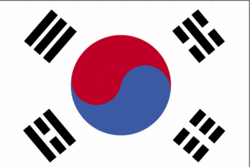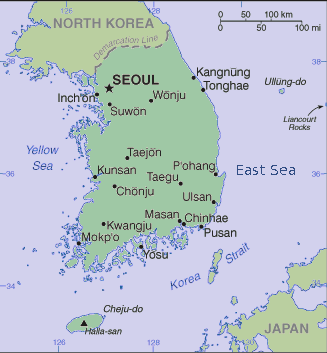Traveling Luck for South Korea. South Korea, Asia
South Korea is located in Eastern Asia, southern half of the Korean Peninsula bordering the Sea of Japan and the Yellow Sea.
Land in South Korea is mostly hills and mountains; wide coastal plains in west and south.
Korean land covers an area of 98480 square kilometers which is slightly larger than Indiana
South Korea has borders with North Korea for 238km.
 Korean national flag (Flag of South Korea)
Korean national flag (Flag of South Korea)
As for the Korean climate; temperate, with rainfall heavier in summer than winter.
Korean(s) speak Korean, English widely taught in junior high and high school.
Places of note in South Korea
 Korean map
Korean map
Regions of South Korea
Korea was an independent kingdom for much of the past millennium. Following its victory in the Russo-Japanese War in 1905, Japan occupied Korea; five years later it formally annexed the entire peninsula. After World War II, a Republic of Korea (ROK) was set up in the southern half of the Korean Peninsula while a Communist-style government was installed in the north (the DPRK). During the Korean War (1950-53), US troops and UN forces fought alongside soldiers from the ROK to defend South Korea from DPRK attacks supported by China and the Soviet Union. An armistice was signed in 1953, splitting the peninsula along a demilitarized zone at about the 38th parallel. Thereafter, South Korea achieved rapid economic growth with per capita income rising to roughly 14 times the level of North Korea. In 1993, KIM Yo'ng-sam became South Korea's first civilian president following 32 years of military rule. South Korea today is a fully functioning modern democracy. In June 2000, a historic first North-South summit took place between the South's President KIM Dae-jung and the North's leader KIM Jong Il.
Since the early 1960s, South Korea has achieved an incredible record of growth and integration into the high-tech modern world economy. Four decades ago, GDP per capita was comparable with levels in the poorer countries of Africa and Asia. In 2004, South Korea joined the trillion dollar club of world economies. Today its GDP per capita is equal to the lesser economies of the EU. This success through the late 1980s was achieved by a system of close government/business ties, including directed credit, import restrictions, sponsorship of specific industries, and a strong labor effort. The government promoted the import of raw materials and technology at the expense of consumer goods and encouraged savings and investment over consumption. The Asian financial crisis of 1997-99 exposed longstanding weaknesses in South Korea's development model, including high debt/equity ratios, massive foreign borrowing, and an undisciplined financial sector. GDP plunged by 6.9% in 1998, then recovered 9.5% in 1999 and 8.5% in 2000. Growth fell back to 3.3% in 2001 because of the slowing global economy, falling exports, and the perception that much-needed corporate and financial reforms had stalled. Led by consumer spending and exports, growth in 2002 was an impressive 7%, despite anemic global growth. Between 2003 and 2005, growth moderated to about 4%. A downturn in consumer spending was offset by rapid export growth. In 2005, the government proposed labor reform legislation and a corporate pension scheme to help make the labor market more flexible, and new real estate policies to cool property speculation. Moderate inflation, low unemployment, an export surplus, and fairly equal distribution of income characterize this solid economy.
Korean natural resources include coal, tungsten, graphite, molybdenum, lead, hydropower potential
strategic location on Korea Strait
Korean religion is no affiliation 46%, Christian 26%, Buddhist 26%, Confucianist 1%, other 1%.
Natural hazards in South Korea include occasional typhoons bring high winds and floods; low-level seismic activity common in southwest.
Travel Advice for South Korea
Korea, Republic of (ROK - South Korea)SUMMARY
- The Democratic People’s Republic of Korea (DPRK – North Korea) reported carrying out a nuclear test on 9 October 2006. There is no evidence of any danger to those living in the ROK (South Korea) as a result of this test. Further developments in the North Korea could potentially give rise to regional tension. Please see the Political Situation section of this travel advice for more information.
- It is recommended that if you come to South Korea for longer than two weeks you should register with the Consular Section of the British Embassy. You should also follow developments in the region closely.
- It is not possible to enter North Korea from South Korea.
- The threat from terrorism in the South Korea is low. But you should be aware of the global risk of indiscriminate terrorist attacks which could be against civilian targets, including places frequented by foreigners.
- Around 67,000 British nationals visit South Korea every year. Most visits are trouble-free. The main type of incident for which British nationals require consular assistance in South Korea is for replacing lost passports, working without the correct documentation and arrests for minor offences.
- We strongly recommend that you obtain comprehensive travel and medical insurance before travelling. You should check any exclusions, and that your policy covers you for the activities you want to undertake. Please see: Travel Insurance.
SAFETY AND SECURITY
Republic of Korea Country Profile.
North Korea reported carrying out a nuclear test on 9 October 2006. Evidence suggests that North Korea carried out an underground nuclear test. However, there is no evidence of any danger to those resident in South Korea as a result of this test. Based on the information available at the time of writing we believe that there is no cause for alarm for British nationals resident in South Korea. Nonetheless, developments in the North Korea could potentially give rise to regional tension.
Taxi drivers tend to speak little or no English. Have your destination written in Korean, with a map for private addresses, as it can be difficult to locate them otherwise.
LOCAL LAWS AND CUSTOMS
Penalties for possession, use, or trafficking of illegal drugs can result in long jail sentences and heavy fines. This applies even to personal use of small amounts of marijuana. British nationals have been detained solely on the basis of drug tests.
Any jail sentence would be served in South Korea. Often, usually where less serious offences are concerned, convicted foreigners may instead be deported. The same may apply to foreigners convicted of offences not involving a prison sentence. If you are deported you may be banned from returning to South Korea for several years.
ENTRY REQUIREMENTS
Visas are required for all other purposes. It is illegal to work on a tourist visa in South Korea, whether as a teacher or in any other capacity. If you wish to work you should contact the nearest South Korean Diplomatic Mission before you travel for information on obtaining the appropriate documentation. In addition, you should research the educational establishment or company where you intend to work as thoroughly as possible. Please see the General section of this travel advice if you are considering a teaching job in South Korea.
Holders of all other types of British passport should contact the nearest South Korean Diplomatic Mission before travelling for information about the visa requirements. Republic of Korea representation in the UK.
HEALTH
Medical and dental care in South Korea is usually of a good standard but can be expensive. Staff often do not speak English.
GENERAL
If you are staying for more than two weeks, we strongly encourage y9ou to register with the Consular Section of the British Embassy. You can find contingency guidance information on the Consular Services Section of the British Embassy website: http://www.britishembassy.or.kr.
Money

 Search
Search South Korea country profile
South Korea country profile Travel advice for South Korea
Travel advice for South Korea